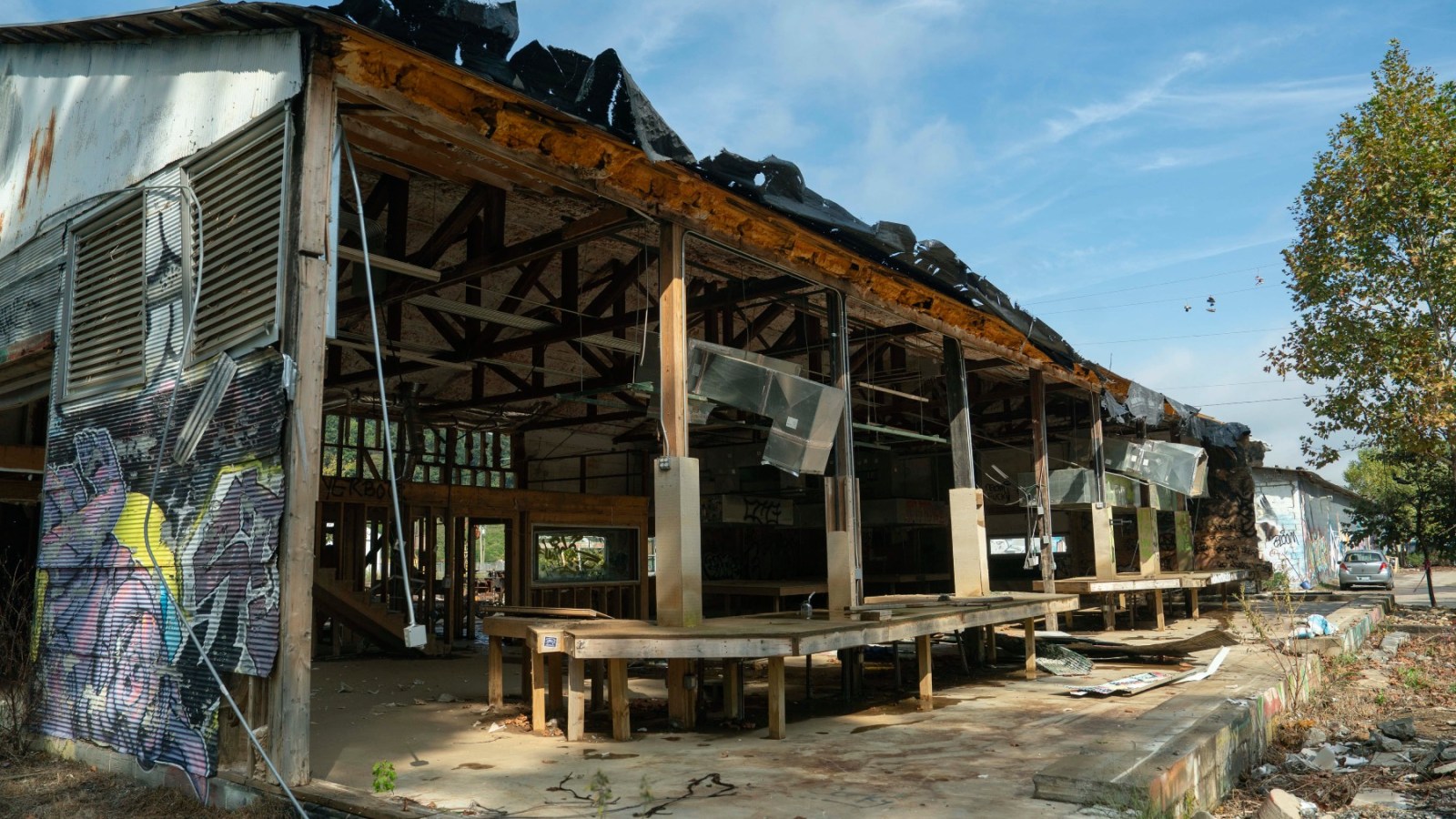On the recent morning of Sept. 27, a handful of early fall rainstorms rolled into the Blue Ridge Mountains of Western North Carolina. By late afternoon, sunshine had overtaken the high peaks and valleys in this corner of Southern Appalachia — a far cry from the chaos and destruction exactly one year ago.
“This morning, I felt fragile, but not to the degree I did a year ago when our whole existence was nearly swept away by the flood,” Lance Mills tells Rolling Stone. “Today, I observed the irony of looking out the windows of our new house at the wreckage of our old house, still frozen in the moment it could no longer be our home.”
On Sept. 27, 2024, Mills, a local singer-songwriter, was awakened by his son telling him the Swannanoa River in their backyard was coming over its banks. In just a few hours, their home in the small community of Swannanoa, located between Asheville and Black Mountain, North Carolina, would be flooded.
Large swaths of Asheville, including its popular River Arts District and Biltmore Village, were pulverized. Small towns along the French Broad River, like Marshall and Hot Springs, were severely affected, with floodwaters either leveling buildings or plastering the structures with thick mud and silt.
By the numbers, Helene dumped upwards of 30 inches of rain across the region, resulting in 108 casualties, 73,000 affected homes, and $60 billion in damages for Western North Carolina alone. One year after the storm, it’s estimated that only around nine percent of requested funds from Congress have actually reached the region. The state’s governor Josh Stein is in a battle with Washington, D.C., to get the billions in needed funds. “Helene is not just a story of destruction and pain, it is also a story of resilience and grit,” Stein said in a social media post on the anniversary. “This recovery is not a sprint, it’s going to be a marathon.”
A year ago, Darren Nicholson, an acclaimed Americana/bluegrass musician, was atop Utah Mountain in his native Haywood County, North Carolina, helping clear driveways of fallen trees for trapped residents. Since the flood, Nicholson, like many artists hailing from these parts, has performed at a string of benefit concerts and fundraisers around WNC. Last October, Luke Combs and Eric Church, both North Carolina natives, staged a massive benefit show at Bank of America stadium in Charlotte.
“We are stronger together, supporting each other,” Nicholson says. “I hope that continues long after the initial push.”
Over the anniversary weekend, Asheville-based Americana group Rising Appalachia headlined a two-day show at Pisgah Brewing in Black Mountain. The event raised much-needed funds and also brought together several grassroots organizations still in the thick of post-Helene recovery, including BeLoved Asheville and ReString Appalachia.
Founded by Nicholas Edward Williams, a singer-songwriter, musicologist, and host of the American Songcatcher podcast, ReString Appalachia aims to replace the instruments of musicians damaged in the flood. So far, more than 600 instruments have been donated, with 550 flood victims able to receive the gifts — a symbolic gesture of empathy and culture in this musically-rich landscape.
“I deeply care about Appalachian music culture. Our project was very intentional. We wanted to know exactly what people lost and wanted to replace one of each thing that they lost,” Williams says. “We understand the mental wellness that music provides, especially in the midst of a disaster, and how you need to process your life somehow. A lot of people do that with music. So, if they didn’t have that opportunity, then how could we help them?”
Since Helene, ReString Appalachia has become a bona fide nonprofit. The organization has offered help in other natural disasters across the nation, including Hurricane Milton last fall, the Los Angeles fires in January, and the Texas Hill Country flood this past July.
“There’s still so much rebuilding that has to happen,” Williams says of WNC in a post-Helene world. “And the amount of underfunding that has been received by our federal government is so unbelievable. It’s incredibly infuriating.”
WNC Long Haul was another vital organization that has emerged post-Helene. A “recovery and resilience fund” through the Community Foundation of Western North Carolina, the entity focuses on distinct mileposts — three month, six-month, one-year, and three-year marks — following the storm.
“I was thinking of it as like a savings account for recovery from Helene,” says WNC Long Haul founder Rachel Dudasik. “After the storm, everybody asked, ‘Where do I give?’ And there were a lot of great places, but what’s going to be harder is when we still need these dollars in the future.”
Since its inception, WNC Long Haul, a donor assisted fund, has given out nearly $500,000 to 23 organizations and nonprofits in need. There’s also a large amount of funds earmarked for the three-year mark. “You see the things that you do make an impact, but it’s still a drop in the bucket,” Dudasik says. “You see the improvement, but then you drive around and see an empty lot that used to be a place you loved.”
A native of Marshall (pop: 777), Dudasik watched her community get destroyed by Helene. With the French Broad River overtaking downtown, every business there was eliminated.
“This community? These old, hunched mountains that raised me? I think we already had it in us to do what needed to be done, and to take care of each other,” Dudasik says. “I just don’t think we knew it yet. The silver lining of the storm was everybody helping out. These mountains weren’t made for the storm, but the people were.”
There are too many stories, too many tragedies, and too many silver linings to properly detail, especially as the national media spotlight has long moved on to the next crisis. But the town of Marshall represents a microcosm of recovery and resiliency in the wake of the floods.
In early May, Marshall hosted a reopening ceremony for the downtown corridor. As officials cut a red ribbon on the steps of the town hall, the sounds of buzzsaws, hammers, and construction vehicles echoed throughout the streets. The work remains, and so do the people.
“I have cried so many times this week just thinking about getting ready for today,” Connie Molland, co-owner of Flow Gallery and treasurer of the Downtown Marshall Association, says. “Ribbon cuttings are new beginnings, and this is a new beginning for our town.”
Located on Main Street in Marshall, Flow was “Business No. 6” to reopen. Prior to Helene, there were roughly 25 businesses in the historic downtown. All were taken out by the flood. According to Molland, around 13 buildings in that small riverside corridor “do not exist today,” with another eight structurally damaged. The town hall and post office have yet to reopen.
“There were days I didn’t know if I could keep doing it, but people just kept showing up,” Molland says of the cleanup. “And I knew it was important for us to reopen.”
Across the street from town hall on Main is Zuma Coffee, the social hub of the community and an anchor business of Marshall since it opened in 2002. It’s also home to a popular Thursday night bluegrass jam. During Helene, Zuma was pummeled, with most of the business going downriver. “As I was watching [the flood], I thought, ‘There’s no way I’m doing this again,’” says Zuma owner Joel Friedman. “But we just got right back into it again. People show up.”
A few doors down from Zuma is the Old Marshall Jail. Even with the business reopening, owner Josh Copus is still running around, covered in dust and paint, either putting finishing touches on his building or helping fellow business owners. “I think it’s important for us to celebrate the progress we’ve made and the work that we’ve done,” Copus says, “while also being very clear to everyone in the world that, ‘This is not over. We are not okay.’”
With the late afternoon sunshine beginning to slowly fade, the barstools at Mal’s, a raucous honky-tonk spot on Main Street, start to fill up. Opened in 2022, it has become one of the go-to places for fellowship and live music in Marshall and the surrounding communities. Right before the river began to rise, Mal’s was still planning to open, but all eyes were on the flood stage. At peak flooding, 11 feet of water smashed through the windows and filled up the bar. Today, Mal’s owner Mallory McCoy and her staff are once again pouring drinks.
“We’re lifers at this point,” she says of the bar’s return. “And I think we have the community that everybody’s looking for. We all do our part.”
Along with being a contributing writer for Rolling Stone, I’m also the arts and culture editor for The Smoky Mountain News, which extensively covers the region. Over that time, I’ve been lucky enough to report from every corner of these mountains. Helene affected me deeply, and as we cross the one-year anniversary of the storm, I’ve struggled to make sense of what happened here, and what still needs to be done.
I lost most of everything I own in “The Flood,” as it’s called nowadays by those who reside in WNC, when the Pigeon River in the small town of Canton overtook its banks and sent a wall of water through downtown and a storage unit I rented. It’s all just stuff, but the emotional toll was real: Mementos of my past were covered in toxic mud and now lie buried in a landfill somewhere.
But most often, I find myself thinking of Lance Mills and Rachel Dudasik. As Mills processes the one-year milestone, there’s a bit of good news in his life. His new home has finally been completed and he and his family moved in just last month.
“Tonight, I’m feeling immense gratitude for the fact that we have a roof above our heads and warm, dry beds to sleep in,” Mills says. “Everything changed a year ago today, except that we have each other and we now understand that nothing else matters more than that.”
Dudasik, meanwhile, remains committed to the work that remains — physical, economic, but also cultural and political. In conversation, she emphasizes that we as a people must retain the hope and compassion seen during the aftermath.
“We need to grasp onto that moving forward, not only to the determination and the dive, but also the humanity of it all,” she says. “That part is easier to lose when you’re not shoveling mud every single day.”



